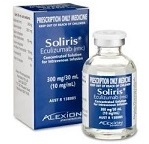On opposite sides of the globe, the collapse of drug-price negotiations has put two big-name pharma products off-limits for patients.
 Canadian provinces have called off talks to cover the $700,000-a-year rare-disease drug Soliris from Alexion ($ALXN), the London Free Press reports. The Pan Canadian Pharmaceutical Alliance--a group created by provinces and territories to tamp down skyrocketing drug costs--"made every effort" to expedite a decision on the drug, its executive officer, Suzanne McGurn, told the publication. But ultimately it couldn't reach an agreement on an appropriate price after 6 months of haggling.
Canadian provinces have called off talks to cover the $700,000-a-year rare-disease drug Soliris from Alexion ($ALXN), the London Free Press reports. The Pan Canadian Pharmaceutical Alliance--a group created by provinces and territories to tamp down skyrocketing drug costs--"made every effort" to expedite a decision on the drug, its executive officer, Suzanne McGurn, told the publication. But ultimately it couldn't reach an agreement on an appropriate price after 6 months of haggling.
"In the face of rising drug costs, provinces and territories have a responsibility to review drug funding requests and to consider clinical effectiveness, safety, cost effectiveness and affordability, and the impact on other health services. This diligence is necessary to continue to provide adequate care while sustaining a publicly funded drug system for generations to come," she wrote.
It's a blow to Alexion, which has scored a lot of government backing for Soliris--despite its general recognition as the most expensive drug in the world. In 2014, the U.K.'s National Institute of Health and Care Excellence (NICE) backed the drug but put conditions on its use, including coordinating Soliris prescriptions through an "expert center" to monitor diagnoses and patient dosages. Also that year, the company announced a reimbursement deal with France that helped its hike its earnings forecast by 18%.
And in Canada, truncating negotiations without an accord is rare, McGurn told the Free Press, noting that the Alliance had agreed to list 86 of the 89 drugs it had considered.
On the other side of the world, New Zealand doctors are angry with Bayer for withdrawing new-age anticoagulant Xarelto from the market after failing to secure a positive reimbursement decision from local government agency Pharmac, New Zealand Radio News reports. With three months' warning, it pulled the drug from 1,500 patients in December; the German pharma had been providing the drug for free during more than three years of negotiations, a practice it said was unsustainable.
"Imminent might have been the wrong word to use but when we set the programme up we certainly believed that funding was only a matter of a fairly short amount of time," Jan Twomey, Bayer's medical director for Australia and New Zealand, told the news service.
But some doctors are worried about switching patients over to other therapies, and they're angry with the company for leaving them in the lurch. "These are potentially very dangerous drugs," one doctor told Radio NZ. "When you switch from one to the other, there's a period of risk."
- read more from the New London Press
- read more from Radio New Zealand News
Special Reports: Top 20 orphan drugs by 2018 - Soliris | Top 15 drug launch superstars - Xarelto - Bayer and Johnson & Johnson